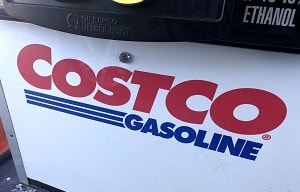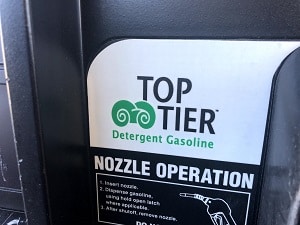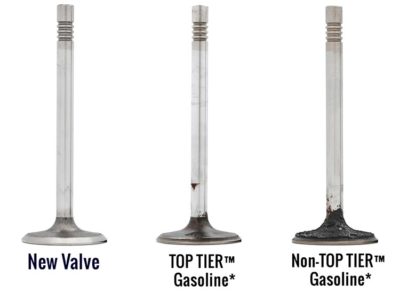Costco Gas: Is Top Tier Gas the Best Gas?

I love buying gas from Costco.
I love Costco gas mostly because it’s insanely cheap. Like 20-25 cents cheaper than my local gas station (and always that cheap, according to many gas apps).
My local station, which is somewhat pricier than average because it’s in a residential area and super convenient for people who live nearby, is a smaller regional company with just a handful of locations.
I try to go when the Costco warehouse isn’t open and when it’s dark out and their lights are on, it looks like an oasis in the desert.
My Costco gas station opens at 6 AM and closes at either 9:30 PM (M-F), 8 PM (Sat) or 7 PM (Sun). It opens three to four hours before the warehouse. It remains open for an hour or two after the warehouse closes.
That’s a nice wide window when the wait will be short.
One day, for like a minute, I wondered – why is it so cheap? Is Costco gas as good as other pricier gas stations? Does it matter?
Table of Contents
Gas is Regulated
Thanks to the Clean Air Act, the Environmental Protection Agency regulates fuel and fuel additives used in cars (and other engines) because burning gasoline contributes to pollution.
The actual regulation is 40 CFR Part 80 (“Regulation of Fuels and Fuel Additives”): subparts A (general provisions, applying to all 40 CFR Part 890 fuels programs), B (controls and prohibitions), C (oxygenated gasoline), D & E (reformulated gasoline), G (detergent gasoline program), H & O (gasoline sulfur) and J & L (gasoline toxics).
Sexy huh?
The point is that with respect to the gasoline itself, it’s all pretty much the same.
It’s All About The Additives, Baby!
What about the additives? These detergents?

These are also EPA approved and there is a certain amount that each company must add to their formulation. They’re added so vehicle engines don’t accumulate carbon deposits and lose efficiency. If you sell gasoline in the United States, you are subject to these rules.
Where things differ is when companies do more than what is required.
In fact, when the EPA announced the minimum gasoline detergent standard in 1995, many companies were putting more than what was required… so they started a “Top Tier” designation. Actually, it’s an industry standard so it’s TOP TIER™ – all caps, trademarked, the whole nine.
The Top Tier designation is not associated with the EPA but is controlled by the industry. To get the logo, you need to meet their specifications.
Who sells gasoline that qualifies as Top Tier? (official list, as of January 2024):
- 76
- Aloha
- ARCO
- Beacon
- Belmont Car Wash
- Cenex
- Chevron
- CITGO
- Conoco
- Costco Wholesale
- CountryMark
- Diamond Shamrock
- Express Mart
- Exxon
- Fast Fuel
- Gold Medal Gasoline
- Harmons Fuel Stop
- Hele
- HFN – Hawaii Fueling Network
- J&E Wendy
- Kirkland Signature Gasoline
- Marathon
- Mega Saver
- Meijer & Meijer Express
- Mobil
- Ohana Fuels
- Phillips 66
- QT
- QuikTrip
- Ranger
- Reeders
- Road Ranger
- Rutter’s
- Shamrock
- Shell
- Simonson Station Stores
- Sinclair
- Sunoco
- Texaco
- True Turbo
- Tulalip Market
- Valero
- Value America
- Waterway Fuels
- Win Win
- Wow
Many of the major gas companies are included.
Does it matter?
This Consumer Reports article seems to think so.
They cite an AAA report that studied the difference between Top Tier and non-Top Tier gasoline. They discovered that non-Top Tier gasoline left more carbon deposits.
Here’s the difference in an intake valve run continuously for 100 hours on a cycle meant to replicate 4,000 miles of real driving:

How much more do you pay for this better gasoline? It’s not likely you do.
Local price competition has a greater impact on price than the additives. Gas stations just off a highway are more expensive than those farther from the exits. Those near a Costco will be cheaper than those farther away.
(Many years ago, I’d get my gas at an Exxon that was a mile away from my Costco because there were never any lines. It was always two cents a gallon more but saved me a good ten minutes of waiting time – an easy trade.)
How is Costco Gas So Cheap?
It’s because gas stations are notoriously difficult businesses. If you run a branded gas station (think Shell, Exxon, etc.), the economics of the business are really challenging.
You’re required to buy a certain amount of gasoline from the brand’s refineries, which means 100% of the gasoline isn’t from the cheapest possible source. This is because each company adds its own mix of additives and detergents. It’s a small percentage but it’s there and so the station has to get it.
Next, they also pay licensing fees and royalties to the brand much like any other franchise.
Lastly, they take all credit cards and can’t negotiate special fee structures that would add to the bottom line.
That’s why most of those gas stations have a convenience store.
💵 That’s where they make most of their money!
Costco doesn’t have to do any of that! They buy whatever gas they want, they obviously don’t pay royalties because they’re company-owned, and they negotiate great fees from credit card processors. You can only use Visa cards right now and that’s because American Express, their previous partner, wasn’t willing to give them as good of a deal.
Costco isn’t cheaper because the gas is cheaper, it’s because the economics of the business are completely different. They make money off the gasoline (and memberships and the warehouse) and not off the convenience store.
Conclusion
Costco Gasoline is better than the EPA regulations for additives and detergents.
It’s also cheaper.
So go when there are no lines and win!